Samurai Champloo is one of the reasons why I like anime. It was one of my first exposures to anime for better or worse. It is hard to enjoy Hershey’s chocolate bars after eating Swiss chocolate. I watched Samurai Champloo before Cowboy Bebop. Perhaps this shapes my opinion of the show, but Samurai Champloo is better than Cowboy Bebop.
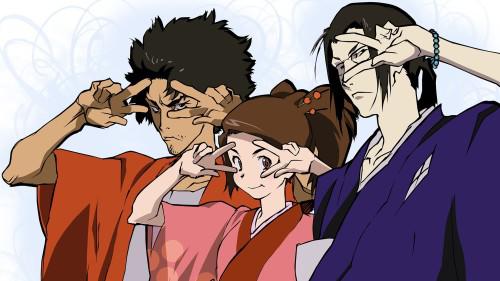 Champloo smashes Tokugawa Japan with hip-hop culture in a way that works quite well. In many regards, today’s hip-hop culture is similar to Edo period Japan. Hip-hop originates from modern cities that have strict economic divisions. Much of hip-hop focuses on overcoming these divisions in one way or the other. Tokugawa Japan was also urbanized. During this period, Japanese cities expanded as people left their farms to try their luck with the wealth cities offered. The period also had strong economic divisions that were difficult, but not impossible, to cross. Hip-hop contains gang culture elements not unfamiliar to Edo period Japan. During this period, Yakuza, or Japanese gangs, vied for economic control of cities, much like street gangs today. Like today’s street gangs, they sold drugs, demanded protection money, owned prostitutes, and used other income avenues. This is the world of Samurai Champloo.
Champloo smashes Tokugawa Japan with hip-hop culture in a way that works quite well. In many regards, today’s hip-hop culture is similar to Edo period Japan. Hip-hop originates from modern cities that have strict economic divisions. Much of hip-hop focuses on overcoming these divisions in one way or the other. Tokugawa Japan was also urbanized. During this period, Japanese cities expanded as people left their farms to try their luck with the wealth cities offered. The period also had strong economic divisions that were difficult, but not impossible, to cross. Hip-hop contains gang culture elements not unfamiliar to Edo period Japan. During this period, Yakuza, or Japanese gangs, vied for economic control of cities, much like street gangs today. Like today’s street gangs, they sold drugs, demanded protection money, owned prostitutes, and used other income avenues. This is the world of Samurai Champloo.
Samurai Champloo is a road story. Mugen, Jin, and Fuu are homeless: the poor of the poor. The story plays on this by using hunger as one of their main motives. Much of the series has the three struggling to make money. At the time, money was something new to Japan. For most of Japanese history, people were paid in koku, measures of rice, and barter. The three vagabonds often lived in the present. Each have their reasons. Mugen seeks to leave his past behind. Jin hides his dishonor by focusing on the present. And Fuu, well, she is simply hungry.
[spoilers ahead]
Samurai Champloo is about the journey and not the end goal. When Fuu finally finds her father, he lies dying. This prevents her from realizing her goal. An assassin from the Shogunate promptly kills the sick man. Only Jin’s intervention keeps Fuu from being killed by the assassin. While the ending is exciting for the viewer, it is anticlimactic for the characters. Fuu fails to punish or fully reconcile with her father. Mugen kills just another pair of enemies in a long line of enemies. Jin kills a master swordsman, but it will do little to improve his reputation as a fallen samurai. In the end, they are back where they started. However, they are not the same people. That is the point of a journey story.
The Ending of Samurai Champloo
I will jump to the end of Samurai Champloo. I’ve already written about it, but it is the type of ending that sticks with you. In road stories, there isn’t a true ending, a happily ever after. They are among the most realistic of stories for this reason. Life goes on.
The ending has the three go their own ways, alone. For many people this is shocking. They developed a friendship over the course of their journey. Then they just left without looking back. How could they?
Because the journey isn’t over.
Each have their own lives to live. If you look closely, Mugen, Jin, and Fuu are all smiling. For Jin and Mugen to smile, that shows just how the journey changed them. The ending gives us hints to where each goes.
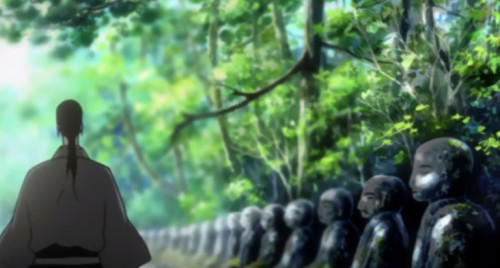 The statues lining the path are jizo. They are said to protect travelers, women, and children. They represent Jizo Bodhisattva, who personifies the Buddhist vow to liberate all beings from suffering. They often line rivers and lakes. Jizo is said to make souls pile rocks by a river in penance. Remember Shino? She was Jin’s love interest he saved from prostitution. She fled to a temple where she must stay for 3 years in order to be divorced from her husband, who sold her to a brothel. Couldn’t Jin visit her? Nope. Men were not allowed at such temples. In the ending, Jin is passing by this island temple, waiting for his lady-love.
The statues lining the path are jizo. They are said to protect travelers, women, and children. They represent Jizo Bodhisattva, who personifies the Buddhist vow to liberate all beings from suffering. They often line rivers and lakes. Jizo is said to make souls pile rocks by a river in penance. Remember Shino? She was Jin’s love interest he saved from prostitution. She fled to a temple where she must stay for 3 years in order to be divorced from her husband, who sold her to a brothel. Couldn’t Jin visit her? Nope. Men were not allowed at such temples. In the ending, Jin is passing by this island temple, waiting for his lady-love.
Mugen doesn’t have a destination or someone to wait for like Jin. He also doesn’t have a home. He was born in a penal colony on the Ryukyu Islands. It isn’t likely he will return there. However, as the ending shows, he is drawn to the ocean. In Mugen’s case we can be certain of one thing, the ninja Yatsuha is certain to find him.
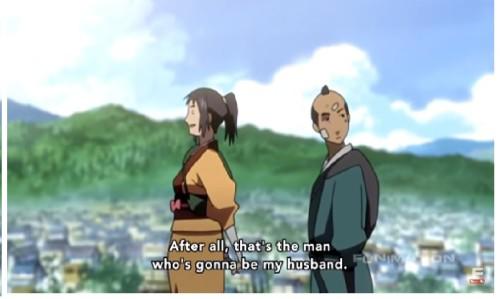 In the episode Bogus Booty, Yatsuha proves to be a match for Mugen. At the end of the episode, she claims Mugen is the man she will marry, and she will find him after both their journeys are over. In other words, Mugen’s adventures are far from over.
In the episode Bogus Booty, Yatsuha proves to be a match for Mugen. At the end of the episode, she claims Mugen is the man she will marry, and she will find him after both their journeys are over. In other words, Mugen’s adventures are far from over.
As for Fuu,,the ending shows her traveling through various towns. Many look like locations from previous episodes. She appears to be traveling back to the town of the first episode. Her likely destination is Kikuzo and Ogin, the elderly couple who she worked for in the first episode. They offered to take her with them after the teahouse burned down. Like Mugen, her adventures have just begun.
This is all speculation, of course. We can each write own stories for Mugen, Jin, and Fuu. That is what makes these endings appealing. Life goes on.
Samurai Champloo reveals the potential anime has for storytelling. When the ending lingers in memory, as this ending does for so many of us, you have a good story. Fiction enriches us. It shows us different worlds and ways of living, Good stories help us see through the eyes of others which improves our ability to empathize with others. Good stories resonate long after they are over. In many ways, their journey never truly ends,
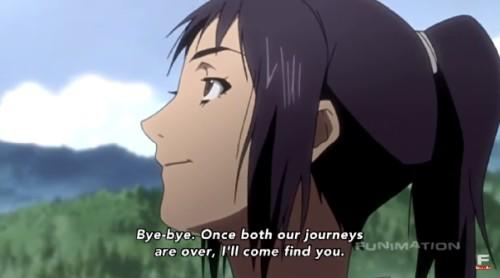
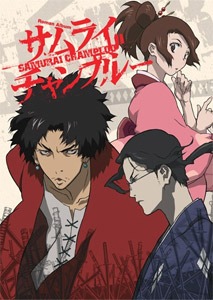

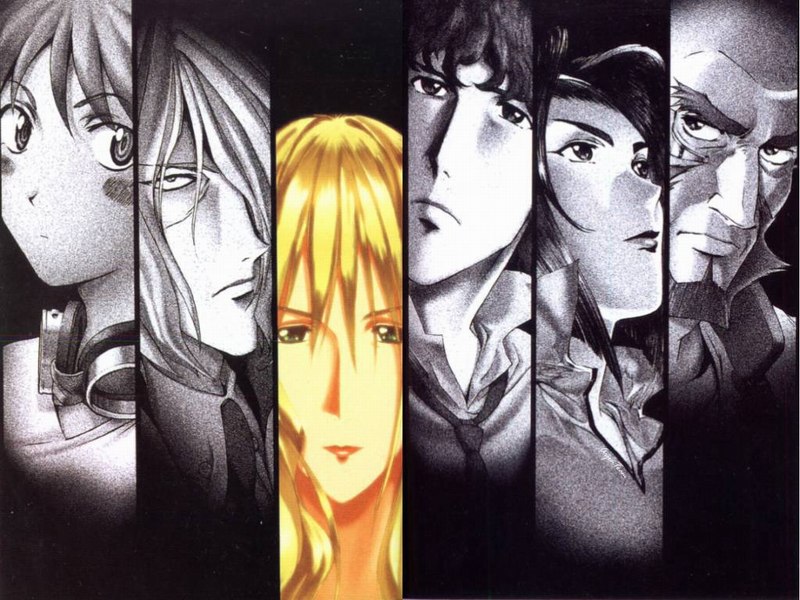
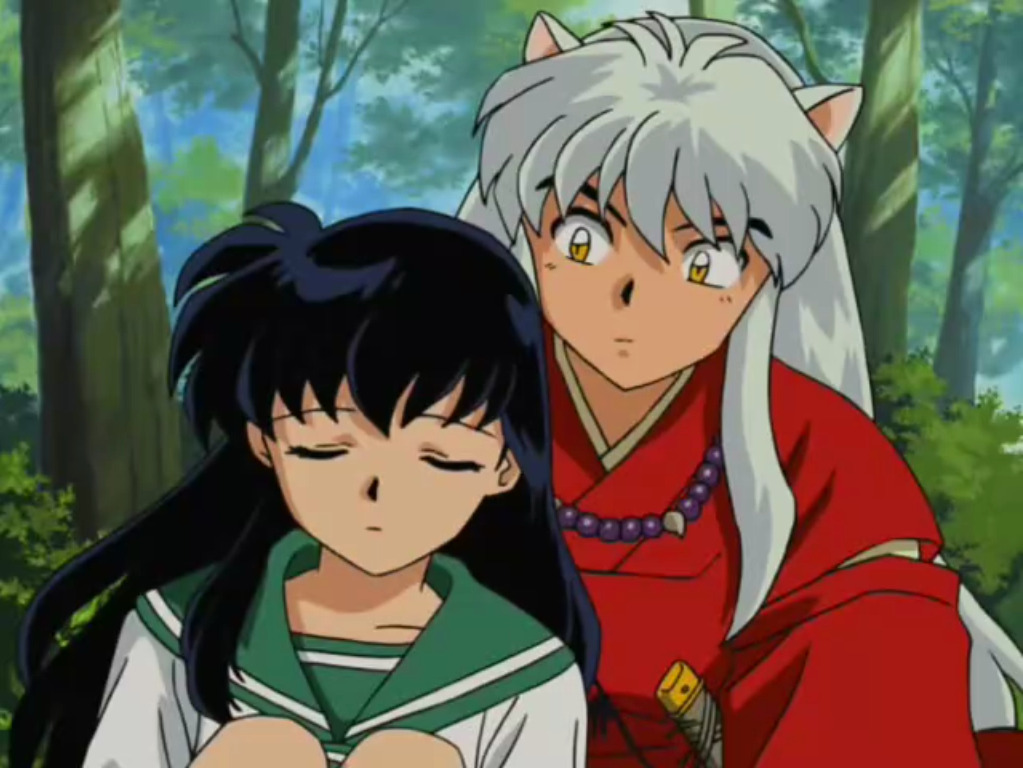
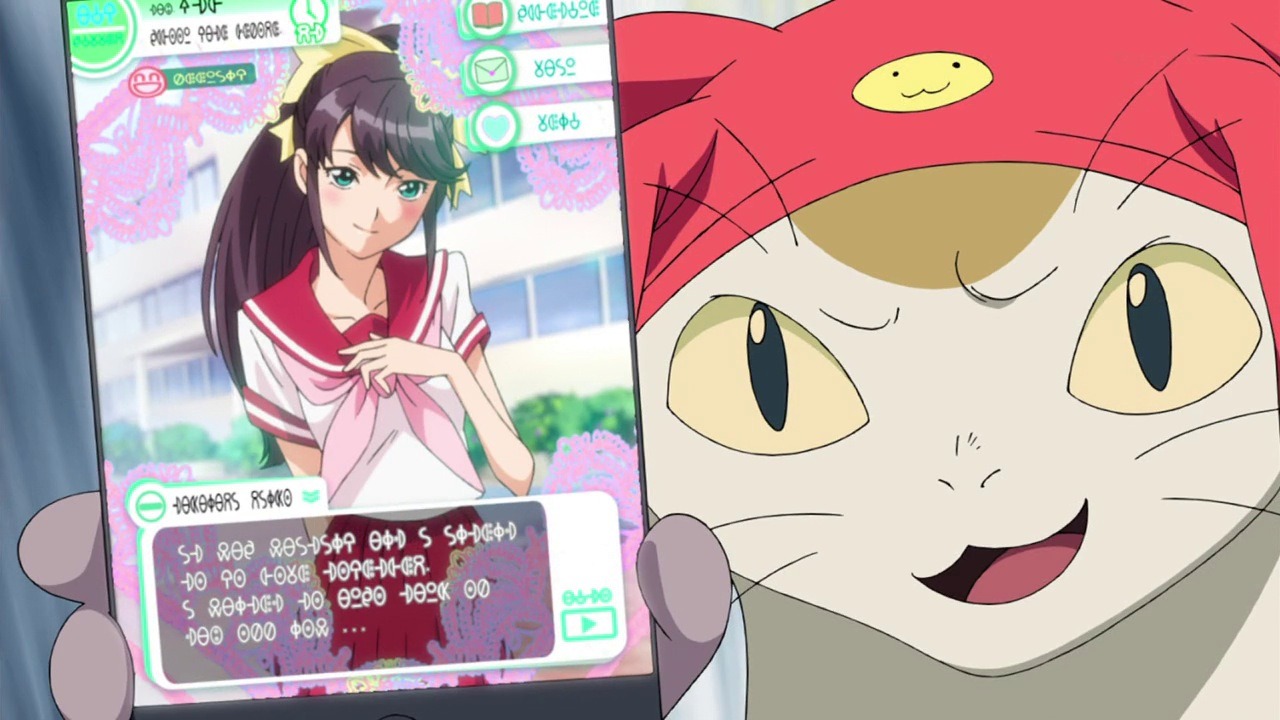
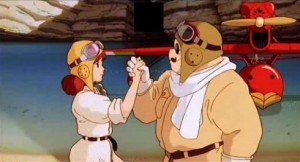
I just noticed i cant delete comments, anyway.
I will delete comments when people request it.
Not gonna lie, i expected mugen to end up with Fuu lol. I just find her cute and Mugen deeply inside him cares about her. Not to mention when Jin said to him “Take care of her”. I wanted to see them together, think whatever u want about me T_T
Yes, the story does hint toward Fuu and Mugen as a potential couple, but it also does that with Jin’s behavior toward her, such as his statement to “Take care of her.” It works well with the open nature of the story.
Well, thanks for the explanation.
I have loathed Samurai Champloo for years because of that nonsense ending.
You have to know all the cultural clues to understand it?
That doesn’t change my mind about the series.
Most viewers wouldn’t understand.
Samurai Champloo stays on my dis list with Ghost in the Shell and Tokyo Ghoul for being too obscure.
Now, if they do a second season where they end up in trouble again and rescue one another, I’ll reconsider.
Hmm. Fuu discovers Jin has been imprisoned and the only way to slip him a file is to dress up as a geisha.
She drops the file in his cell and walks on by.
Later, Mugen learns that Fuu is being pursued by a guard who fell in love with her, and distracts him long enough for her to get away…
Jin saws through the bars and escapes, going looking for them.
I can understand why many people would dislike Samurai Champloo because of the ending. Some anime titles assume a Japanese audience or an audience versed in Buddhist ideas. Ghost in the Shell dabbles in many Buddhist themes along with themes from all sorts of other philosophies. Anime is great because it offers such a variety of stories. Most people can find something they enjoy.
The only “cultural knowledge” that would be helpful is that of the jizo statues. You could still guess Jin’s plan based off how the episode with his girl ended anyway. You’re just dense and want to be spoon fed all the answers.
Creo que todos murieron porque cuando se reúnen incluso uno de los que cuidaban al samurai que olía a flores y había sido asesinado aparece hablando con ellos además mugen no podía sobrevivir a la explosión y Jin se había atravesado a sí mismo y sin embargo al final aparecen como si nada sin heridas ni rasguños es muy probable que ya hayan muerto
The death hypothesis is also an interesting possibility.
I have just seen the series. This is a perfect appraisal. Feels like the ending of Fleabag if you have seen it. Thanks!
I haven’t seen Fleabag. I revisit Samurai Champloo every so many years. The series remains fresh and interesting.
Fleabag is not anime but very clever writing. Recommend it.
I think I’ll be purchasing the SC Blu-ray to do the same and watch every few years.
I loved this article… This is copied by a website as their own. Please look into the copyright violation.
The website’s name is AnimeIndia.
Thank you for bringing it to my attention! I’ve contacted the website. I hadn’t given them permission to repost the article.
I love to explore some old websites, and here I just found a great analysis! I hope you’re enjoying your life as I write this comment, Mr.Kincaid
I’m glad you enjoyed the article. I released a new article every Sunday if you want to read more.
Excellent analysis.
I believe this as well but I also had the thought that maybe they keep bumping into eachother.
Many times in the story they separated and were reunited.
I like to think that they all walked separate paths only to reunite later down the road. Temporarily or otherwise. Either way. Great ending
I suspect their paths would cross at times too. The fact people still talk about the ending and the possibilities shows how great it is.
I think you hit the nail on the head with your plot synopsis and foreshadowing of their journey’s not ending. The story is definitely about the journey and not the end goal. Each character grows and learns from one another which is impact their future destinations.
Samurai Champloo does a good job in showing how life keeps on. The story handles death throughout, especially Mugen’s story arcs, which contrasts with the ending: that of life being lived.